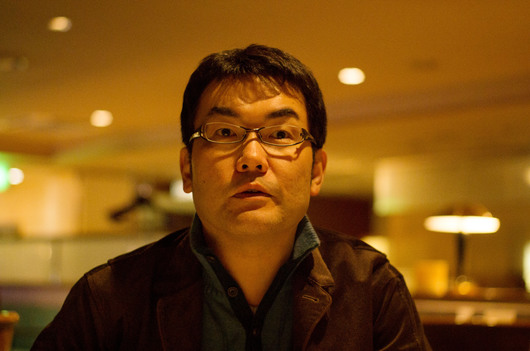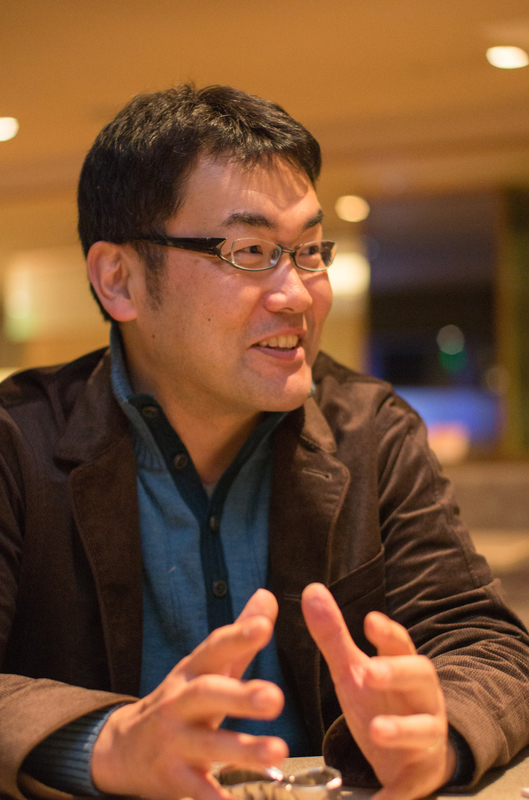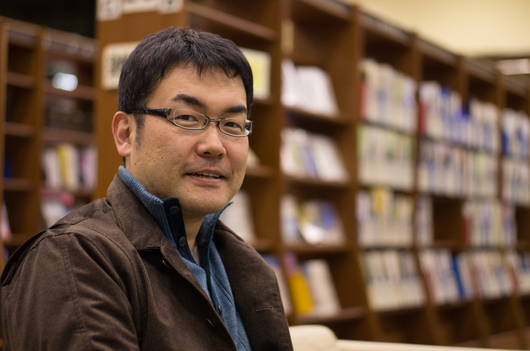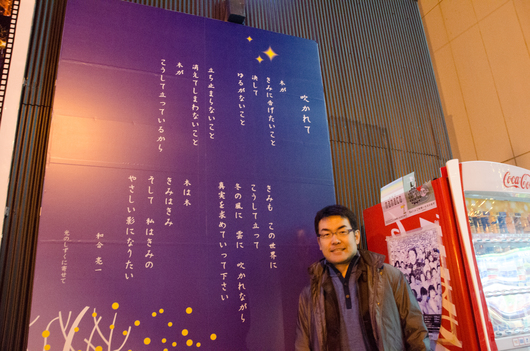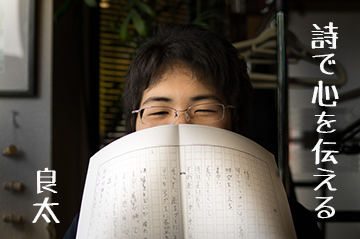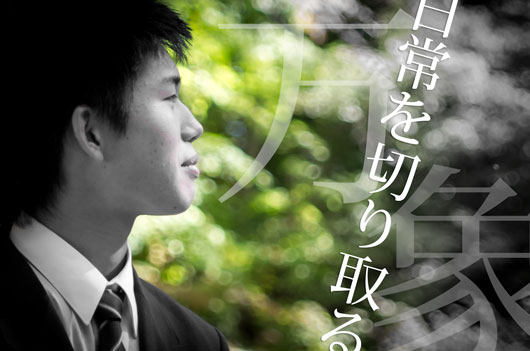The Power of Words
vol.3
Engaging with Words
Wago Ryoichi Poet and Fukushima resident
2013.04
On March 11, 2011, a devastating earthquake shook the eastern coast of Japan, triggering massive tsunamis that swallowed up homes and towns and swept thousands of people to their death. In Fukushima prefecture, this was followed by a nuclear meltdown, forcing the entire population in the vicinity of the nuclear power plant there to be evacuated. On the sixth day, as aftershocks continued to rumble and residents battled the fear of a radiation cloud, Fukushima poet Ryoichi Wago [Wago Ryoichi] began tweeting lines of poetry on Twitter. His single-digit group of followers soon grew into tens of thousands.
We asked Wagō to comment on the power of words.
The earthquake struck on March 11, and the next day, a hydrogen explosion occurred at Reactor 1 at the Fukushima Dai-ichi Nuclear Power Plant. Then the same thing happened at Reactor 3 on March 14, and all residents of the area where I lived were ordered to either evacuate or stay indoors. As aftershocks that seemed virtually the same as the original quake continued one after another, high readings on radiation dosimeters prevented us from going outside; we were told not to even so much as open a window. With no telling how long this would last, I sent out a tweet to let people know I was all right. And at first, that was all I intended--I had no thought of using Twitter for anything more than that. But then it hit me: I was itching to write poetry. something. So I tweeted the following line:
Radiation is falling. It is a quiet night.
This was on the sixth day after the quake. From then on, I sent out a continuous stream of tweeted lines of poetry. I kept it up for three months, almost compulsively. I wanted people to know what was really happening to me, what was really happening in Fukushima.
Many times, I would send off a barrage of forty or fifty in just a couple of hours. I called these tweets "Pebbles of Poetry."
There are people who look at my tweets and say, "This isn't poetry." It's true that my language is very plain and unadorned, even clumsy. The poetry I wrote before the quake was abstract and highly imagistic, but my aim was to communicate the disaster unfolding before my eyes to as many people as possible, and I seem to have instinctively turned to simpler language that is more easily understood.
Twitter Gave Me Back My Voice
For the five days before I began tweeting, I had effectively lost my power to utter a word. You have to understand that we had nothing. No electricity, no gas, no gasoline, no running water, food supplies rapidly dwindling. "Man does not live by bread alone," they say, but I was starting to think man does live by bread alone. I'd always taken pride in being able to express myself as a poet, teacher, and father, but now I felt powerless to say anything. I felt as if I had nothing left in me.
For the five days before I began tweeting, I had effectively lost my power to utter a word. You have to understand that we had nothing. No electricity, no gas, no gasoline, no running water, food supplies rapidly dwindling. "Man does not live by bread alone," they say, but I was starting to think man does live by bread alone. I'd always taken pride in being able to express myself as a poet, teacher, and father, but now I felt powerless to say anything. I felt as if I had nothing left in me.
For the five days before I began tweeting, I had effectively lost my power to utter a word. You have to understand that we had nothing. No electricity, no gas, no gasoline, no running water, food supplies rapidly dwindling. "Man does not live by bread alone," they say, but I was starting to think man does live by bread alone. I'd always taken pride in being able to express myself as a poet, teacher, and father, but now I felt powerless to say anything. I felt as if I had nothing left in me.
Wago Ryoichi's Twitter stream from the time is preserved here.
http://togetter.com/li/117615?page=1
An English translation of the first part can be read here.
[http://www.japanfocus.org/-Jeffrey-Angles/3568]
Wago Ryoichi's HP
和合亮一氏朗読「高台へ」
Before I Found My Medium of Expression
From grade school through high school, the existence of poetry and literature were very distant from my life. But I think I did have a strong creative streak from early on--a deep-seated desire to make something of my own.
In grade school I pretended I was a radio announcer and recorded shows on tape, and I edited my own newspapers and posted them on the wall at home. Basically, I clipped articles I liked out of the regular newspaper and pasted them on construction paper, and then wrote in my own thoughts and comments.
In junior high school I became a huge fan of Yellow Magic Orchestra and thought I'd like to make music, too. But I couldn't read music, nor could I play any instrument . . . plus I hated practicing! So in the end I decided I wasn't cut out to be a musician.
In high school, a friend in the drama club said they didn't have enough members and begged me to join, so I switched to that from the kendo club. I suppose I must have had a latent desire to do something in public. I continued with theater when I went on to college. The trouble was, I would really throw myself into the actual performances, but I still hated rehearsals. I got a lot of flack from the others for not taking rehearsals seriously.
My Encounter with Poetry
So I couldn't make music, and I didn't last in theater--I'd never really gone all-out with anything. But I still had this yearning to do something creative--to make something of my own. One day when I was browsing in the university bookstore, I happened to pick up an issue of Gendaishi techo (Handbook of Contemporary Poetry; a monthly journal published by Shichosha), and a poem I saw in the letters section made me think, "This is it!" It was very avant-garde, and I couldn't really figure out what it was supposed to mean, but I was fascinated. I'd found what I was looking for--the creative something I'd been yearning to do. So I started writing with that as my model.
Once you've composed a poem, the next thing you want is for someone to read it. So I printed up copies and handed them out in front of the university gates--rubbing elbows with the helmeted student protesters passing out their latest grievances. (Laughs) Plenty of people would take my fliers, but then I'd find them scattered on the ground on the way to class--all trampled with footprints, or crumpled up in a ball. See that made me see reality for what it was, but I'd get fired up to write something the next day that wouldn't get tossed away like that.
After the copies, I moved up to pamphlets. Just a few pages that I stapled together myself. I got the student bookstore to put some copies on display, and I tried to get other bookstores nearby to do the same, but they turned me down flat. Quite cold-heartedly, in fact. It was another taste of what poets have to go through to be heard in our society. (Laughs)
そStill I forged onward, undaunted. They say "Seek, and you will find," and I think it's true. I kept on looking, and ultimately I found poetry. And once you find what you're looking for, it's also important to follow through so that you don't lose it.
福島県立図書館にて
Turning Point
For ten years after I began writing poetry, which was basically all during my twenties, it was a lonely profession, composing works that no one read. Then I published my first real book, a collection called After, for which I received the Nakahara Chuya Prize (available in English; translation by Juliet Winters Carpenter, 2000), and at long last found some recognition coming my way. I was of course elated to get the prize, but just seeing my work appear in the form of a book was already a very big deal for me. Once something has visible shape, it leads to the next step.
People often ask me, "What is poetry?" Some have answered this question by saying, "Poetry is life," or "Poetry is language," but for me, poetry is action. You write a poem, and then you take whatever action is necessary to get people to read it.
So in college I wrote poetry and printed out copies to give to passers-by, and after the 3/11 disaster I wrote poetry and sent it out on Twitter. The poet needs to think all the way through to how he will get his poems into readers' hands, because otherwise, I'm sorry to say, people just don't go looking for poetry.
The history of modern poetry in Japan is so short that people don't see poetry as a social necessity.
The Poetic Constraints of Twitter
Before the earthquake, I don't think it would ever have occurred to me to write poetry on Twitter or in any other space on the Internet. I had always assumed that writing or writing poetry, meant putting words on paper. And in Japan, anyway, many works of literature, including writing poetry, are written in vertical lines, so I assumed it had to be done that way.
I think it definitely helped that Twitter limits each tweet to just 140 characters. It imposes a certain form. Before this, I'd been intent on building "big boxes." I would pour over long poems that took a long time to complete--for example, spending an entire month on a single composition. I once produced a book with a single, 2,000-line poem.
But on Twitter, I could only use 140 characters at a time. My only option was to take these small "boxes" as building blocks. Piling them one on top of another would create a larger whole. And I suppose it's precisely because they're small that I could keep piling on one after another.
It helped, too, that Twitter has something of a return-postcard element built into it. It's not just a one-way transmission. Followers tweet back. Or they retweet my posts. In a matter of a minute they respond to what I've written. Then, when I read their responses, it triggers ideas about what I want to write next. It's like a game of catch.
The Power of Words
In my engagement with words since the earthquake, I've been struck by how words have not only a present but a past and a future as well. Words connect us in the present day with the heart and soul of people of the distant past. At the same time, we all pray for a future that is beautiful and kind and full of opportunities for everyone, of course, but unless that prayer is embodied in the way we use our words, we can't expect such a future to come our way; only if we make our words beautiful will we be able to see that beautiful something in our future. That's what I thought as I wrote my poems. Words are repositories of all sorts of things that we can't experience in the present, and they also have soul, and they have light. I experienced periods of despair and sadness after the earthquake, but even in the midst of such darkness, I longed for light, and still do. And I think the light I long for lodges in words.
If we don't start by believing in the power of words, then we can't save anyone, and we can't speak of any real future. Without words, we can't take the next step. Without first giving shape to what we think and feel, we can't begin to see the future. It's when we give these things shape that we become able to take the next step. There are various taboos, of course. The nuclear meltdown, for example, or of the great many people who died. . . . But even if something is taboo, if we don't speak of it, we can't move on. This, too, is something I learned from the 3/11 disaster.
In the past, poets have often remained aloof from the social issues of their time, but I've come to believe we need to be much more involved in community building and nurturing and training people. We need words that make a difference, words that are well crafted, in order for people to really understand each other, and I think poets can play an important role in helping that to happen.
Right now, I have nearly forty students coming to the poetry classes for children I supervise, and it's become increasingly clear to me what the purpose of these classes needs to be. My hope is that these children will become poets who take an active role in building and shaping their communities.
Words Rooted in Experience
Many people break into tears when they read the poems written by the students in the poetry school. These children experienced the disaster full force, body and soul, and so they choose every word with great care, weighing each one as they try to express exactly how they feel. I wonder whether we adults weigh our words anywhere near as carefully when we speak, when we try to convey our feelings. I think once you've learned how to energize your words in writing, it completely changes how you choose and use words in other circumstances, too. It's with words that we offer encouragement, but it's also with words that we drive someone into a corner or make them feel forsaken.
Many people break into tears when they read the poems written by the students in the poetry school. These children experienced the disaster full force, body and soul, and so they choose every word with great care, weighing each one as they try to express exactly how they feel. I wonder whether we adults weigh our words anywhere near as carefully when we speak, when we try to convey our feelings. I think once you've learned how to energize your words in writing, it completely changes how you choose and use words in other circumstances, too. It's with words that we offer encouragement, but it's also with words that we drive someone into a corner or make them feel forsaken.
Words have their limits, but it's the desire to somehow reach beyond those limits that leads to the writing of poetry.
*Jeffrey Angels' translation of tweet taken from: Wagō Ryōichi, "Pebbles of Poetry: The Tōhoku Earthquake and Tsunami," The Asia-Pacific Journal, Vol 9, Issue 29 No 4, July 18, 2011.
*Jeffrey Angels' translation of tweet taken from: Wagō Ryōichi, "Pebbles of Poetry: The Tōhoku Earthquake and Tsunami," The Asia-Pacific Journal, Vol 9, Issue 29 No 4, July 18, 2011.










